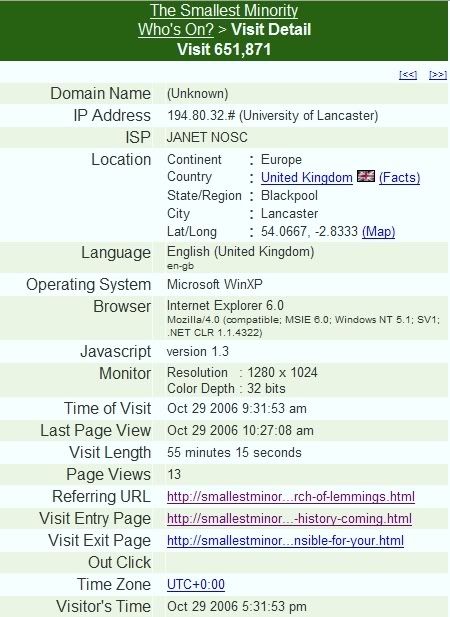Joe Huffman writes a response to the überpost, and begins with this devil’s advocate question:
(Kevin) says:
But the ideas of Western civilization in general, and the American philosophy in specific have proven themselves superior.
“Superior” on what scale? How is it that you measure that superiority? By the scale used by Muslims we are arrogant, decadent, and sinful. We drink alcohol. Our women, who are the tools of Satan, are allowed to tempt men with exposed skin in public are allowed to attend schools. We charge interest on the loaning of money. We do not pray to Allah. We tempt the youth of the faithful to desert that which is holy and become sinful. We have succumbed to Satan. Our power is not proof of our superiority. It is proof of the bargain we have made with the Prince of Darkness.
The Germans in the late 30’s had a “noble goal” as well–“purification” of the human race. A similar argument could be made of the Japanese in the same time frame.
Who are you to say Western civilization is superior? By what measure and how have you determined that measure is superior?
As I say in my piece, I believe there is one fundamental right – a man’s right to his own life (or a woman to hers.) This is the core of Lockean philosophy, and the measure of liberty in any society is how well the government of that society protects that right and its corollaries, though in practice none do it (or can) perfectly. The utopian vision of the anarcho-capitalists is a society that does so, perfectly, by not having a government at all. But this is only a dream, because you can never get a group of three or more people who will agree on what all of the corollary rights are, and there will always be people who will go along to get along. During a phone conversation last night with Publicola, I mentioned that I wanted to use a quote in the überpost, but I wasn’t able to work it in anywhere. It’s another Heinlein quote:
You can never enslave a free man, the most you can do is kill him.
Too many people are not free even in their own minds. That’s one of the reasons coercive societies work, and utopist societies don’t.
But on to Joe’s specific question, how do I measure Western civilization’s superiority? By this:
In America your destiny is not prescribed; it is constructed. Your life is like a blank sheet of paper and you are the artist. This notion of being the architect of your own destiny is the incredibly powerful idea that is behind the worldwide appeal of America. Young people especially find the prospect of authoring their own lives irresistible. The immigrant discovers that America permits him to break free of the constraints that have held him captive, so that the future becomes a landscape of his own choosing.
If there is a single phrase that captures this, it is “the pursuit of happiness.” As writer V. S. Naipaul notes, “much is contained” in that simple phrase: “the idea of the individual, responsibility, choice, the life of the intellect, the idea of vocation, perfectibility, and achievement. It is an immense human idea. It cannot be reduced to a fixed system. It cannot generate fanaticism. But it is known [around the world] to exist; and because of that, other more rigid systems in the end blow away.”
And this:
When soldiers from any other army, even our allies, entered a town, the people hid in the cellars. When Americans came in, even into German towns, it meant smiles, chocolate bars and C-rations. — Stephen Ambrose
Western philosophy in general, and the American philosophy in particular, best protects the right of its citizens to their own lives. As a result of this, America has become the superpower that it is. It draws those who understand that they are free, and “blows away” more rigid systems, generally without having to fire a shot.
But we are not perfect. This blog and many like it stand as testament to the fact that even nominally free governments constantly arrogate power, and are loath to surrender any they have taken. The only thing that can slow this (I don’t think it can be stopped) is the resistance of their citizens. If enough of those citizens understand that they are free, then the predation of government can be limited, but if too many are ignorant or apathetic their eventual enslavement is highly likely.
And I’m not putting on a tinfoil hat here and blaming the Trilateral Commission or the Bilderburgers or the Skull and Bones Society or any other shadowy group. I’m with Justice Louis Brandeis here:
The greatest dangers to liberty lurk in the insidious encroachment by men of zeal, well meaning but without understanding.
And Robert J. Hanlon:
Never attribute to malice that which is adequately explained by stupidity.
Or, in this case, ignorance and apathy. (Ignorance is curable. Stupidity is organic.)
Joe continues in his essay:
Paraphrasing Greg Hamilton here: In the eyes of Muslims what Osama Bin Laden has to say about the West is as inherently obvious, once articulated, to them as the superiority of Western civilization is to us.
True. Once again, two incompatible philosophies are now fighting it out for domination. The question is open as to which will win, since our side has an internal component that is trying to tear it down from the inside. That component is made up of those who are not Lockean in philosophy, and who see that philosophy as hypocritical and false:
The State (in Germany) and the Emperor (in Japan) were what the individual existed to serve. Hence, we were “playing by their own rules” by killing civilians in our efforts to defeat the Germany state and the Emperor of Japan. And even then it is clear that many had serious qualms about the actions taken. We weren’t blind to the hypocrisy of suspending our principles. It was a reluctant pragmatic concession to reality not mapping perfectly to our theory of individual rights.
Our “suspension of principles,” our hypocrisy, is the spike on which our internal opponents attempt to spindle Lockean philosophy. This was the point of the überpost. We must understand that the ideals of Lockean philosophy must yield to objective reality when objective reality rears its ugly head.
All societies are defined by their philosophies, and their philosophies are, in effect, shared delusions. When placed in conflict, objective reality highlights the flaws in those philosophies, and makes them obvious. If the society will not recognize the flaws and take pragmatic steps to counter their effects, that society will most probably be on the losing side of the conflict. AFTER the conflict that society can once again resume its suspended belief, or it can continue on in some changed form. Americans dropped firebombs on German cities and firebombs and nuclear weapons on Japanese cities, killing tens of thousands of innocent children. Then we helped rebuild Japan and Germany into economic powerhouses – powerhouses that far better protect the rights of their citizens than the old societies did.
The point of the whole rights discussion has been one of pragmatism vs. absolutism. Islam is an absolutist religion. So is communism/socialism. The American belief in individual rights tends very hard towards absolutism, but it has been flexible and pragmatic enough to survive the Civil War and two World Wars without deforming too far. Western culture is being attacked from within and without by absolutists who accuse it of falseness because of the fact that we have acted against the absolute requirements of our stated creed. Unless we believe as a society that what we fight for are ideals – things worth believing in – and not self-evident, absolute, positive, unquestionable, fundamental ultimates, then we run the risk of losing the conflict because we won’t make the pragmatic concessions necessary to survive.
UPDATE: Right as Usual comments.






